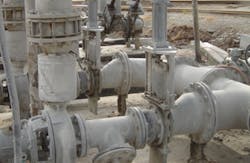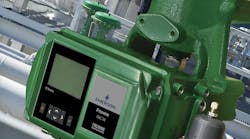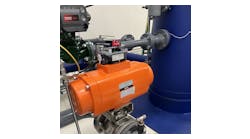From the abrasive bitumen found in the Canadian oil sands, to the acidic and flammable solutions common in chemical plants, to the scaling-prone mixtures sitting in agricultural processing facilities, valves are used to start, stop and control a wider range of slurry compositions.
Slurry valves have a critical role in optimizing the operating time of the processes in which they are employed. Select the right slurry valve for the application, and plants are able to experience extended uptimes and increased production.
On the flip side, selecting the wrong slurry valve for the application can mean reduced production and increased maintenance. Not all slurry valves are created equal, and valve selection can make or break production goals for companies that use slurries in their processes.
Let’s take a quick look at some valve applications from the last 20 years. And, by the way, the last 20 years constitutes 20 years of valve innovation.
Mining & hydrocarbon engineering
Mining and hydrocarbon engineering require unique and well-differentiated valves — ones that can withstand intense abrasion and extreme pressures.
Take, for example, valves used in bitumen extraction in the Canadian oil sands. Hydro-transport slurries carrying bitumen ore from the mining pits to extraction plants include large, jagged stones as well as coarse sand and clay. Bitumen itself has a density similar to cold molasses, so it requires heat and high pressures to transport it long distances to extraction plants.
The valves most commonly used are heavy-duty knife gate valves, fitted with sharp blades to cut through sticky bitumen. They often include scrapers engineered to remove bitumen from gates as part of opening and closing. The valve gates are of hardened materials such as 17-4PH stainless steel and also frequently feature abrasion-resistant coatings like tungsten carbide to extend their uptime.
At ITT Engineered Valves, the Fabri-Valve HD line of heavy-duty knife-gate valves can withstand abrasive, high-pressure oil sands slurries.
In concentrator plants, where precious metals like copper, lead, zinc and molybdenum are mined in the form of raw ore and then concentrated, actuating the flow is important — especially in the later stages of refining.
For this, push-through valves fitted with special abrasion and impact-resistant sleeves are often used. These synthetic sleeves are comprised of elastomers — most commonly, natural rubber. Alternate sleeve materials for use in specialized applications in the concentrator plants, such as froth flotation, are constructed of materials that won’t break down during prolonged exposure to the hydrocarbon enriched slurries running through them. Highly concentrated slurries also require non-discharging valves so precious product is not discharged to the ground or localized drains.
ITT Engineered Valves’ Fabri-Valve 33 PTA and 33 PTD slurry valves have a push-through design where opposing elastomeric sleeves are compressed against each, using axial forces from attached pipe flanges.
Agricultural fertilizer processing
Valves for agricultural fertilizer production must withstand everything from scale build-up to hot-acid flushing.
Diammonium phosphate, an essential ingredient for plant growth, comes from the phosphate found in marine fossils. Diammonium phosphate production includes some of the most scaling-prone slurries in modern processing.
As scale is continuously deposited on pipe walls and valves, slurry flow is constricted. Every few weeks, the pipes and valves are back-flushed with hot acid to reclaim as much of the full diameter of pipe cross-surface as possible. Valves for these applications often have to be inspected after only a few weeks of operation and, if necessary, be cleaned or repaired. Bonded slide gate valves are used to break through heavy scaling and maintain positive shutoff and are constructed of materials that can stand up to the hot acid.
The Fabri-Valve F133 is a bi-directional soft-seated, slide-gate valve for on/off service in heavy and scaling slurries. The seats are able to self-gasket and are compatible with raised or flat-faced, lined or unlined flanges. A containment bonnet attached to the bottom flange captures any discharge during cycling.
Chemical engineering
The world of chemical engineering, with applications ranging from food and pharmaceutical processing to the treatment and transport of hazardous materials, implies a broad range of unique valve requirements.
For example, one unique slurry-transport application involves a superfine powder called titanium dioxide, which is bright white and often used in paint and other home products such as vinyl siding. It is incredibly abrasive, due to its jagged particulate state, which is crystalline and cubic, tetragonal or orthorhombic in shape. Imagine solid crystals that are very hard, flowing suspended in high-density slurry. These slurries are essentially liquid sand paper.
Components of titanium dioxide transport systems made of ordinary metals often require frequent replacement. Non-customized valves might be changed weekly or multiple times per week when a plant is operating at full production. That’s why replaceable hard-faced seats and Inconel gates are often recommended for isolation when it comes to these slurries. This can extend uptimes and triple or quadruple the amount of time between replacements.
The Fabri-Valve F134 bonneted knife-gate valve is for use in difficult services to provide high-cycle stem sealing and superior stem seal containment.
In pulp and paper processing, recycling is one of the most difficult valve applications. It is the first step in the production of secondary fiber for papermaking. Producing clean fiber means the proper removal of contaminants like staples, wire and other trash. Valves that perform for years in other applications may last only a few weeks due to the erosion created in the cleaning process.
To meet these uncompromising tasks, easily replaceable seats, hardened alloy gate materials and flush ports to withstand the rigors in the recycling and reject portions of paper processing are necessary.
The Fabri-Valve C42 reject valve, which utilizes Stellite overlays in the face and bore, is commonly recommended or customized for these applications.
Power plant systems
The power industry, with its high heats and unique ash, as well as its limestone and gypsum slurries, requires valves that aren’t often found elsewhere. Hot ash and fluids rich in chlorides pose unique problems for plant engineers.
At coal-burning power plants, ash must be removed from exhaust gases before those gases can be treated and released to atmosphere. Several methods exist to capture and transport both dense bottom ash and powdery fly ash, both heavily abrasive by nature.
Valves used to control ash flow, whether conveyed as slurry or by pneumatic conveyance, often require hardened gate materials including ceramic overlays. Valves used in ash applications frequently need specific built-in features, such as chest liners to inhibit ash buildup in the chest area of the valve. Additionally, these valves often feature seal materials like Aflas, which withstand temperatures up to 400 F.
Looking around at various growth industries like power, agricultural engineering and mining, it’s clear that, as processes and systems improve, more specialized slurry valves are playing critical roles in these systems. ITT Engineered Valves has been developing specialty valves for difficult applications like these for over 60 years.
Chris Swarr is global product manager at ITT Engineered Valves.
ITT Engineered Valves is focused on extending uptimes and aiding bottom line growth for our partners by delivering highly customized valves to meet the most rigorous and unique needs in the marketplace. We specialize in building better valves when the ones currently deployed simply aren’t getting the job done. If you have a special valve need, ITT Engineered Valves would love to help you tackle it.


